泛读教程 第三册 Unit 2 课件 答案
泛读教程 第三册 Unit 2 课件 答案培训课件
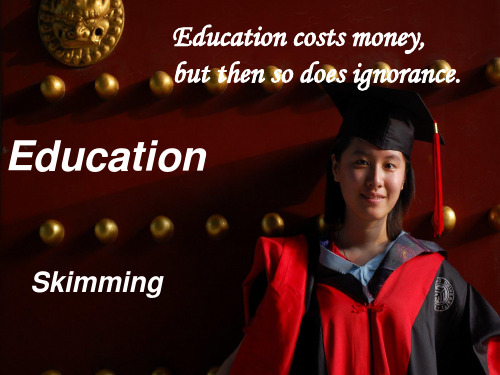
Reader Factors
Vocab Level
How many words do you determine to learn per day?
To Learn
Comprehension Corຫໍສະໝຸດ parts, topic, main
Ability
idea and details
Background Knowledge
Education costs money, but then so does ignorance.
Education
Skimming
LOGO
Education's purpose is to replace an empty mind with an open one. Education is what remains after one has forgotten everything he learned in school. - Albert Einstein (1879-1955)
Phrase Reading Example
❖Actually, the common cold is not
as simple as it seems. It can be
caused
by any of 200 different
viruses, and it can bring misery in
Phrase reading is a technique that builds fluency, aids comprehension, and improves oral reading.
Techniques for Speed Reading
英语泛读教程3Unit 2
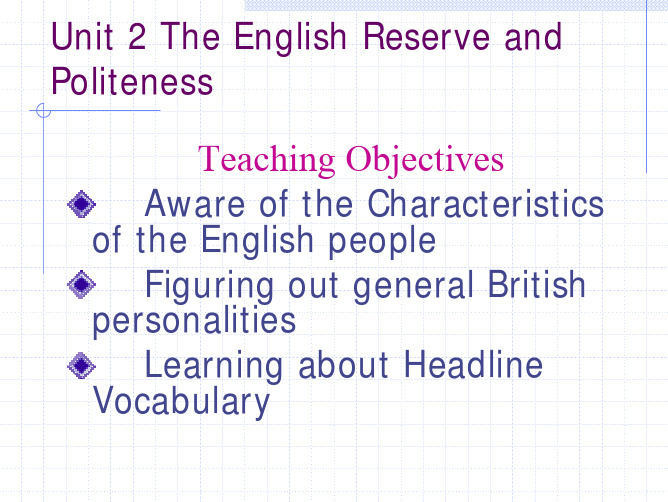
Structure and Signals
Para 5 Another feature in Britain is politeness. [6-end] 1) All politeness is based on the elementary rule of showing consideration for others, and acknowledging the consideration they show to you. [6-8] 2) Politeness to woman and old people.[9-11] *Politeness to woman is less observed today than it is used to be. [9] * The same principle applies to old people.[10] * It follows that mature Europeans have no desire to grow old or look older than they are. [11] Come to the point directly
In daily life, personal greetings are much more frequently used in Chinese language than in English language, while non-personal greetings are preferred in English language. The reason for that is that in English culture, personal facts are regarded as one’s privacy which people do not like to talk about with other people except intimate friends, while in Chinese culture, these greetings are used to show considerations towards others. So if the
《泛读教程》_第三册(Unit1~Unit10)
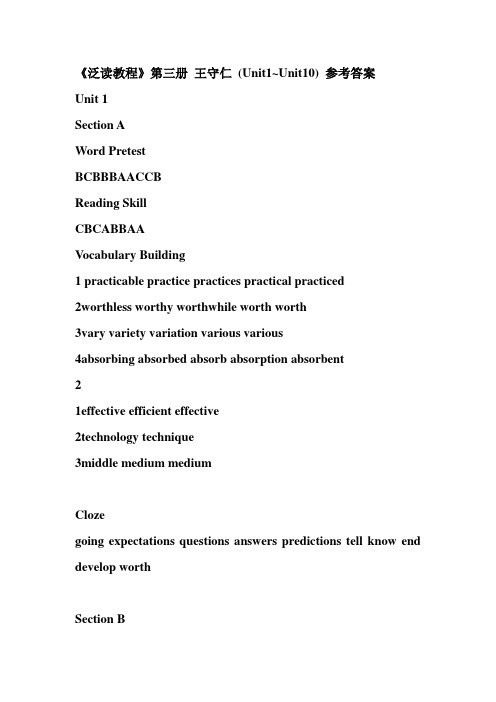
《泛读教程》第三册王守仁(Unit1~Unit10) 参考答案Unit 1Section AWord PretestBCBBBAACCBReading SkillCBCABBAAVocabulary Building1 practicable practice practices practical practiced2worthless worthy worthwhile worth worth3vary variety variation various various4absorbing absorbed absorb absorption absorbent21effective efficient effective2technology technique3middle medium mediumClozegoing expectations questions answers predictions tell know end develop worthSection BTFTT CBCC TFF CAACCASection CFFTFFTTTUnit 2Section AWord PretestABACCABABCCReading SkillCBB FTFFTTVocabulary Building11mess 2preference 3aimlessly 4remarkable 5decisive 6shipment 7fiery 8physically 9action 10housing21aptitude attitude2account counted counted3talent intelligenceClozeother just has some than refuse see that without if ready wrongSection BACCCCCCCACBABASection CCCDDACUnit 3Section AWord PretestABCCBDCDCReading SkillBABCAACBCVocabulary Building1Admission admit admissible admissiblyReliance rely reliable reliablyDefinition define definite definitelyAssumption assume assumed assumedlyBehavior behave behavioral behaviorallyVariety vary various variouslyPart part partial partiallyManager manage managerial manageriallyCorrelation correlate correlative correlativelyAdaptation adapt adaptive adaptively21inspired aspired inspired2token badges token3contemporaries temporary contemporaryClozeCommunicate ways using in of message meet causes meaning to eyesSection BBABBAC FFTTTF CCBSection CBBDDBCCA FFTFFTUnit 4Section AWord PretestCACAABBBCCReading SkillBBACBCCAAVocabulary Building11moist 2betrayal 3exclusively 4inhumane 5amazed 6endangered 7marvels 8deadly21dessert deserted2favourite favorable favorable3awarded reward awardedClozeParents idea at seen landmarks instance migrate guide pole effect it if experimentsSection BCCB FTF BCACCBACCSection CFFTFFFTTFTUnit 5Section AWord PretestCAABCACCCReading SkillCABCB FFTFTTVocabulary Building1Assumption assume assumed assumedly Acknowledgement acknowledge acknowledgedly Reflection reflect reflective reflectively Domination dominate dominant dominantly Category categorize categorical categoricallyImplication imply implicative implicativelyReassurance reassure reassuring reassuringlyDefinition define definite definitely21historical historic2rejected resist3test analyzedClozeExisted over head body found language use single passed ahead survival handlingSection BCABCBB TTTFTT CACSection CBBAAACBCUnit 6Section AWord PretestC ACBABACABABReading SkillCAACACCAVocabulary BuildingAvailability avail available availablyConquest conquer conquering conqueringlyLuxury luxuriate luxurious luxuriouslyOrgin orginate original originallyOccurrence occur occurrentSystem systematize systematical systematicallyPhonology (这个是没有动词形式的)phonological phonologicallyDecision decide decided decidedlyVariety vary various variouslySuperiority (这个是没有动词形式的)superior superiorlyPeculiar particular particularAssess access accessResources source sourcesClozeSex men differs compliment complimenting causes makes languages have outside understood have use circleSection BCBBBACBCCCCBACCBASection CBBCABBACCBUnit 7Section AWord PretestABABCBACReading SkillBBBCCBCBVocabulary BuildingDeduced behavior adhere replacement option delicacy enormous pursuitInquired required inquire requiredCompatible comparable compatible comparableClozeSatellite some space asked life sort orbiting have living were believe own solar where likely living throughSection BFTFFTTTTTFFFBBCACCSection CBCBCCAEDEBAFDCUnit 8Section AWord PretestBCABCBBCCAReading SkillCBABCBCCCCVocabulary BuildingOccupation occupy occupational occupationallySegregation segregate segregated(这个没有副词)Discrimination discriminate discriminating discriminatingly Enforcement enforce enforceable enforceablyExclusion exclude exclusive exclusivelyPerseverance persevere persevering perseveringlyConviction convict convictive convectivelyAmendment amend amendable(这个没有副词)Superficiality superficialize superficial superficially Spectator spectate spectatorial (这个没有副词)Job career jobs careerPrincipal principles principal principleFeminine female feminineClozeAcceptable domestic property wages husband divorce claims legal suit permitted make excluded lacked belonged determined Section BBACCCCACCCAABBACTTFSection CCCAACBUnit 9Section AWord PretestBAABCACBBABCReading SkillCACCBBBBBACBVocabulary BuildingTypifies dominant familial competitive vibrate descended departure boom countless symbolizesRecreation recreates recreationRhythm rhyme rhymes rhythmClozeSea within of divides built celebrated inside attract together whenSection BFTFTTCCBBCBAACCACSection CBAACABCCCCUnit 10Section AWord PretestCABCBBBBABReading SkillCBCACCCABBVocabulary BuildingConsequence(这个没有动词形式)consequent consequently Sophistication sophisticate sophisticated sophisticatedly Reference refer referable referablyConversation converse conversational conversationally Space space spatial spatiallyDetachment detach detachable detachablyIntervention intervene intervening(这个没有副词)Type typify typical typicallyAssure ensure assured ensureArises raised rise raised arisenClue cues clue cueClozeWell separating is own close need look order respect follow prior sign help was elseSection BBBCTTFBCACACTFFSection CTFFTFFFF。
英语泛读教程3第三版(刘乃银)答案
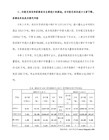
Home Reading:
cdacd ddc
Unit 13
Text:
A. c B. cdcad bab D. cbada cabdb Fast Reading:
cdacc caccd bdbdb
Home Reading:
bdbcc bdd
Unit 14
Text:
A. c B. ddcad dab D. dacad babad b
英语泛读教程3第三版刘乃银版答案
Unit 1
Text:
A. c B. bdabb ddc D. addad cdb
Fast Reading:
dbdda abaad cbbdc
Home Reading:
dacdd aab
Unit 2
dcbca bccbc bcddd
Home Reading:
dcdca bd
Unit 10
Text: A. c B. cdccd bacac D. dcdbc acadc bd
Fast Reading:
dbdcc dccdb bddca
A. d B. acbda dcaac D. abaac daccd ad
Fast Reading:
daada cddbc bdcdb
Home Reading:
cbadb cddbc
Unit 8
Text:
A. c B. cddcc dccb D. abdac aaa
bcadb bcddd
Unit 12
Text:
A. b B. bbbdd ccc D. cdccd acdba dca
大学英语泛读教程3(第三版)课件Unit 2

A Do You Get It?
Multiple Matching
The following people (a-d) are mentioned in the text. Match the people with the images (1-4) below.
c
a
d
b
U2-p.20
U2-p.14
Track 4
Hume’s Circle
In his essay Of the Standard of Taste, published in 1757, the Scots philosopher David Hume attempted to answer the question of how we can make meaningful statements about art. Rather than paying attention to some supposed essential qualities in an artwork, Hume suggested that we should define and appreciate such works through the opinions of qualified critics. No sooner had Hume put forward his argument, than his opponents pointed out the problem with it. Hume was basically arguing that good art was defined by good critics. But good critics were defined as critics who identified good art. Thus, Hume was arguing in a circle.
泛读教程3
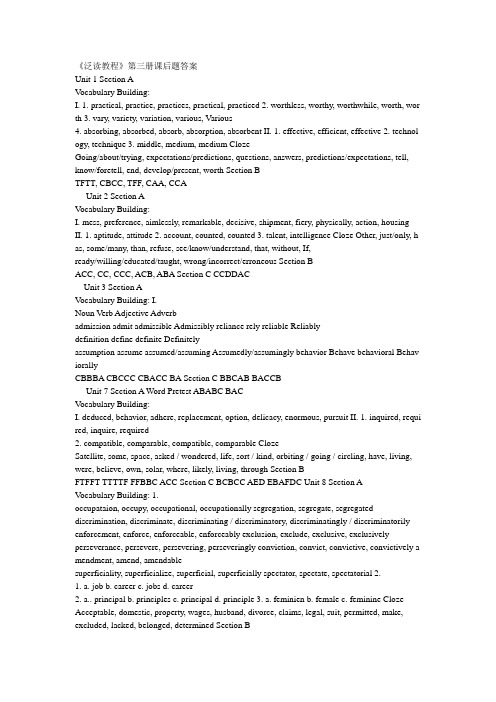
《泛读教程》第三册课后题答案Unit 1 Section AV ocabulary Building:I. 1. practical, practice, practices, practical, practiced 2. worthless, worthy, worthwhile, worth, wor th 3. vary, variety, variation, various, Various4. absorbing, absorbed, absorb, absorption, absorbent II. 1. effective, efficient, effective 2. technol ogy, technique 3. middle, medium, medium ClozeGoing/about/trying, expectations/predictions, questions, answers, predictions/expectations, tell, know/foretell, end, develop/present, worth Section BTFTT, CBCC, TFF, CAA, CCAUnit 2 Section AV ocabulary Building:I. mess, preference, aimlessly, remarkable, decisive, shipment, fiery, physically, action, housing II. 1. aptitude, attitude 2. account, counted, counted 3. talent, intelligence Cloze Other, just/only, h as, some/many, than, refuse, see/know/understand, that, without, If,ready/willing/educated/taught, wrong/incorrect/erroneous Section BACC, CC, CCC, ACB, ABA Section C CCDDACUnit 3 Section AV ocabulary Building: I.Noun Verb Adjective Adverbadmission admit admissible Admissibly reliance rely reliable Reliablydefinition define definite Definitelyassumption assume assumed/assuming Assumedly/assumingly behavior Behave behavioral Behav iorallyCBBBA CBCCC CBACC BA Section C BBCAB BACCBUnit 7 Section A Word Pretest ABABC BACV ocabulary Building:I. deduced, behavior, adhere, replacement, option, delicacy, enormous, pursuit II. 1. inquired, requi red, inquire, required2. compatible, comparable, compatible, comparable ClozeSatellite, some, space, asked / wondered, life, sort / kind, orbiting / going / circling, have, living, were, believe, own, solar, where, likely, living, through Section BFTFFT TTTTF FFBBC ACC Section C BCBCC AED EBAFDC Unit 8 Section AV ocabulary Building: 1.occupataion, occupy, occupational, occupationally segregation, segregate, segregated discrimination, discriminate, discriminating / discriminatory, discriminatingly / discriminatorily enforcement, enforce, enforceable, enforceably exclusion, exclude, exclusive, exclusively perseverance, persevere, persevering, perseveringly conviction, convict, convictive, convictively a mendment, amend, amendablesuperficiality, superficialize, superficial, superficially spectator, spectate, spectatorial 2.1. a. job b. career c. jobs d. career2. a.. principal b. principles c. principal d. principle3. a. feminien b. female c. feminine Cloze Acceptable, domestic, property, wages, husband, divorce, claims, legal, suit, permitted, make, excluded, lacked, belonged, determined Section BBACCB CACCC AABBA C TTF Section C CCAACBUnit 9 Section AV ocabulary Building: 1.1. typifies2. dominant3. familial4. competitive5. vibrate6. descended7. departure8. boom9. co untless 10. symbolizes 2.1. a. recreative b. recreates c. recreation2. a. rhythm b. rhyme c. rhymes d. rhythm ClozeSea, within, of, divides, built/constructed/completed, celebrated, inside/in, attract, together, when Section BFTFTT CCBBC BAACC AC Section C BAACA BCCCC Unit 10 Section AV ocabulary Building: 1.consequence, , consequent / consequential, consequently / consequentially sophisticatiion, sophisti cate, sophisticated, sophisticatedly reference, refer, referable, referablyconversation, converse, conversational, conversationally space, space, spatial/spacious, spatially/s paciouslydetachment, detach, detachable/detached, detachably/detachedly intervention, intervene, interveni ng type, typify, typical, typically 2.1. assure, ensure, assured, ensure2. arises, raised, rise, raised, arisen3. clue, cues, clue, cue ClozeWell, separating / isolating, is, own, close, need, look, order, respect, follow, prior, sign/cue, help, was/were, else Section BBBC TTF BCA CAC TFF Section C TFFTF FFFUnit 11Section AV ocabulary Building: 1.information, inform, informative, informatively specification, specify, specific, specifically addition, add, additional /additive, additionally / additively specialty, specialize, special, specially narration, narrate, narrative, narratively extension, extend, exxtensive, extensively origin, originate , original, originally explosion, explode, explosive, explosively ambiguity, , ambiguous, ambiguou sly establishment, establish, established1. extension2. mabiguity3. orignal4. specified5. additional6. unambiguously7. explosion8. information9. specialized 10. narrative 11. establishment 2. 1. transform, transferred, transferred, transformed 2. lonely, alone, lonely, alone Cloze Library, am ounted, own, burned / destroyed, countries’, send, suggestion / proposal, library Section B ACBCB ACCAC ABABB AB Section C BCACC CBCCCUnit 12 Section AV ocabulary Building:1. reaction, mass, polluting, planetary, suspicious, alarming, emitted, emerged2.1. warned, threatened2. spread, spread, sprayed3. emergency, emergence ClozeSolve, communities, creative, prevention, disposal, resources, recycloing, waste, increase, place, measures, amount Section BFFTT BCAC FTFF ABC CBC Section C BCAAC CBCUnit 13 Section AV ocabulary Building: 1.symptom, symptomize, symptomatic, symptomatically longing, long, longing, longingly addition, add, additional additive, additionally / additively manifestation, manifest, manifest, mani festlydepression, depress, depressed / depressing, depressedly / depressingly invariability, , invariable, i nvariably separation, separate, separate, separatelycondemnation, condemn, condemnable, condemnably imagination, imagine, imaginary, imaginaril y affection, affect, affecting, afeectingly 2.1. remedies, recipe, remedy, recipe2. alternate, altered, alternate, alter3. acknowledged, knowledg e, acknowledged ClozeStep, acknowledge, prevent, essential, physician, due, physical, psychosomatic, disease, confidence, symptoms, thorough, emotional, upsetting Section BCBCAB CBBCB ABCAC Section C TFFFT FTFFF Unit 14 Section AV ocabulary Building: 1. reluctant, evolution, atrributed, catastrophic, assoicate, indifferent, emerge d, stir 2.1. evolved, revolved, evolved2. dismay, dismal, dismal, dismay3. contribute, attributed, contributed, attributed ClozeCharacteristic / trait / nature, changed / had, to, long, get/eat, possessed / developed /had, stretched/lengthened, longer, passed, After, have, theory, effect/influence, notion/idea, change Section B DAB FTFTF DAD BAC FTF Section C TFTFT FTF Unit 15 Section AV ocabulary Building: 1.Prevention, prevent, preventive, preventively Federation, federate, federal, federally Inadequacy, , inadequate, inadequately Deception, deceive, deceptive, deceptively Prosperity, prosper, prosperou s, prosperously Life, live, live/living/aliveEffect, effect, effective, effectivelyEvaluation, evaluate, evaluable /evaluative Resident, reside, residential, residentiallyVision, vision, visional /visionary, visionally / visionarity1. evaluabtion,2. federal3. prosperity4. residential5. effect6. are living7. deceptively8. preventive /effective 2.1. simile, metaphor2. ultimate, unanimous, ultimate, unanimous ClozeTransportation, distance / away, ground, Steam, trains, electric, station /stop, name, train, three, trains, stairs/steps, passengers/people Section BDCDCC CCCAB CB Section C CCACC CCC。
泛读教程第三册答案---精品模板

Keys to Reading Course 3 Unit 1 Reading StrategiesSection AWord Pretest1-5。
BCBBB 6-10。
AACCBReading Skill2-5。
CBCA 6—9。
BBAAVocabulary Building1。
a. practicable/practicalb. practicec. practices d。
practicable/practical e。
practiceda. worthlessb. worthy c。
worthwhile d. worth e. wortha. vary b。
variety c。
variation d. various/varied e. Variousa. absorbingb. absorbedc. absorb d。
absorption e。
absorbent2。
1。
a. effective b。
efficient c. effective2. a. technology b. technique3. a。
middle b。
medium c. mediumClozegoing/about/trying expectations/predictions questions answerspredictions/expectations tell know/foretell end develop/present worthSection B1—5. TFTTC 6—10. BCCTF 11-14:FCAAC 16-17:CASection C1-5. FFTFF 6—8. TTTUnit 2 EducationSection AWord Pretest1-5. ABACC 6—8。
ABAReading Skill4-6。
CBB 1—6。
FTFFTTVocabulary Building1.mess 2。
泛读教程-第三册-Unit-2--答案PPT课件

Skimming
2
Contents
Speed Reading Speed Techniques What is Skimming When to SKIM How to SKIM
3
Reading Speed
800
600 300 150
20
Phrase reading is a technique that builds fluency, aids comprehension, and improves oral reading.
7
Techniques for Speed Reading
How to Phrase Read
Group words that naturally go together To Read efficiently you should try to get rid of bad reading habits and get into good ones Group words together into meaningful units Studying economics is difficult because it requires careful attention to facts and figures
14
❖Skimming is the reading style used by flexible readers when their purpose is to quickly obtain a general idea about the reading material. The Skimming style is most useful when you have to read a large amount of material in a short amount of time. When using the Skimming style, you should identify the main ideas in each paragraph and ignore the details in supportive sentences. Because you are only looking for the main idea in each paragraph you read, a lower level of comprehension is to be expected than when using the Study Reading style
泛读教程第三册unit1~18答案全
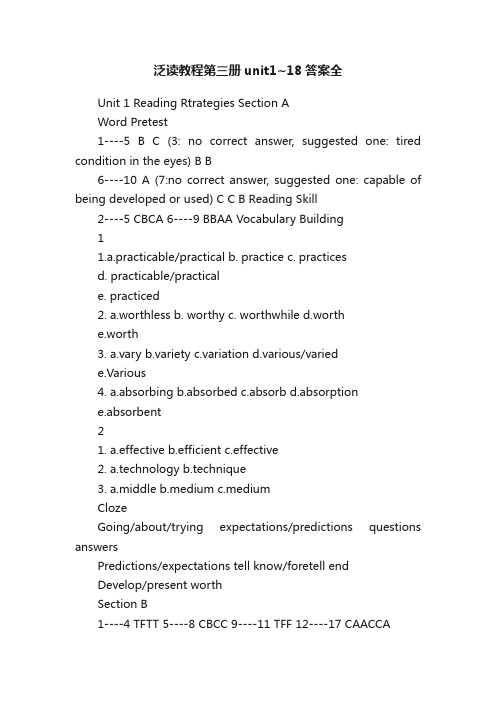
泛读教程第三册unit1~18答案全Unit 1 Reading Rtrategies Section AWord Pretest1----5 B C (3: no correct answer, suggested one: tired condition in the eyes) B B6----10 A (7:no correct answer, suggested one: capable of being developed or used) C C B Reading Skill2----5 CBCA 6----9 BBAA Vocabulary Building11.a.practicable/practical b. practice c. practicesd. practicable/practicale. practiced2. a.worthless b. worthy c. worthwhile d.worthe.worth3. a.vary b.variety c.variation d.various/variede.Various4. a.absorbing b.absorbed c.absorb d.absorptione.absorbent21. a.effective b.efficient c.effective2. a.technology b.technique3. a.middle b.medium c.mediumClozeGoing/about/trying expectations/predictions questions answersPredictions/expectations tell know/foretell endDevelop/present worthSection B1----4 TFTT 5----8 CBCC 9----11 TFF 12----17 CAACCASection C1----4 FFTF 5----8 FTTTUnit 2 EducationSection AWord Pretest1----5 ABACC 6----11 ABABCCReading Skill4----6 CBB1----6 FTFFTTVocabulary Building11. mess2. preference3. aimlessly4. remarkable/marked5.decisive6.shipment7. fiery8.physically9.action 10.housing2 1. a.aptitude b.attitude2. a.account b.counted c. counted3. a.talent b.intelligenceClozeOther just/only has some/many than refuse see/know/understand that without If ready/willing/educated/taughtwrong/incorrect/erroneousSection B1----5 ACCCC 6----10 CCCAC11----14 BABASection C1----6 CCDDACUnit 3 Body LanguageSection AWord Pretest1----5 ABCCB 6----9 DCDCReading Skill2----5 BABC 6----10 AACBCVocabulary Building1admission admit admissible admissibly reliance rely reliable reliablydefinition define definite definitely assumption assume assumed/assuming assumedly/assuminglybehavior behave behavioral behaviorally variety vary various/varied variously/variedly part/partiality part partial partially manager manage managerial managerially correlation correlate correlative correlativelyadaptation/adaption adapt adaptive adaptively 21.a. inspired b. aspired c. inspired2.a. token b. badges c. token3.a. contemporaries b.temporary c. contemporaryClozecommunicate ways/means/ones using/saying in ofmessage meet/have/encounter/experience causes meaning to eyesSection B1----6 BABBAC 7----12 FFTTTF 13---15 CCB Section C1----4 BBDD 5----8 BCCA1----6 FFTFFTUnit 4 AnimalsSection AWord Pretest1----5 CACAA 6----10 BBBCCReading Skill2----5 BBAC 6----10 BCCAAVocabulary Building11. moist2. betrayal3. exclusively4. inhumane5. amazed/amazing6. endangered7. marvels8. deadly21.a. dessert b. deserted2.a. favourite b. favourable c. favourable3.a. awarded b.reward c. awardedClozeparents idea at/by seen landmarks instance/example migrate guide/direct pole effect/influence It/This if/whether experiments Section B1----3 CCB 4----6 FTF 7----10 BCAC 11----15 CBACCSection C1----5 FFTFF 6----10 FTTFTUnit 5 HistorySection AWord Pretest1----5 CAABC 6----9 ACCCReading Skill2----6 CABCB1----6 FFTFTTVocabulary Building1assumption assume assumed/assuming assumedly/assuminglyacknowledgement acknowledge acknowledged acknowledgedlyreflection reflect reflective reflectively domination dominate dominant dominantly category categorize categorical categorically implication imply implicative implicatively reassurance reassure reassuring reassuringly definition define definite definitely21.a. Historical b. historic2.a. rejected b. resist3.a. test/analyze b. analyzedClozeexisted/appeared over head/brain body found language use/value/significance/importance single passed ahead survival/existence handling/overcoming Section B1----6 CABCBB 7----12TTTFTT 13----15 CAC Section C1----4 BBAA 5----8 ACBCUnit 6 LanguageSection AWord Pretest1-----5 CACBA 6----10 BACAB 11----12 AB Reading Skill3----6 CAAC 7----10 ACCAVocabulary Building1availability avail available availably conquest conquer conquering/conquered conqueringlyluxury luxuriate luxurious luxuriouslyorigin originate original originally occurrence occur occurrent 无副词形式system systematize systematical/systematic systematicallyphonology 无动词形式phonological phonologicallydecision decide decided/decisive decidedly/decisivelyvariety vary various variouslysuperiority 无动词形式superior superiorly21.a. peculiar b. particular c. particular2.a. assess b. access c. access3.a. resources b. sources c. sourcesClozesex Men differs compliment/words complimentingcauses makes languages have outside understood have use circle/world/field Section B1----5 CBBBA 6----10 CBCCB 11----15 CBACC 16----17 BA Section C1----5 BBCAB 6----10 BACCBUnit 7 SpaceSection AWord Pretest1----4 ABAB 5----8 CBACReading Skill1----4 BBBC 5----8 CBCBVocabulary Building11. deduced2. behaviour3. adhere4.replacement5. option6.delicacy7. enormous8. pursuit21.a. inquired b. required c. inquire d.required2.a. compatible b. comparable c. compatible d. comparable Clozesatellite some space asked/wondered life sort/kind orbiting/going/circling have living were believe ownsolar where likely living throughSection B1----5 FTFFT 6----10 TTTTF 11----12 FF13----18 BBCACCSection C1----5 BCBCC 6----8 AED1----6 EBAFDCUnit 8 WomenSection AWord Pretest1----5 BCABC 6----10 BBCCAReading Skill1----5 CBABC 6----10 BCCCCVocabulary Building1occupation occupy occupational occupationally segregation segregate segregated discrimination discriminate discriminating/discriminatorydiscriminatingly/discriminatorilyenforcement enforce enforceable enforceably exclusion exclude exclusive exclusively perseverance persevere persevering perseveringlyconviction convict convictive convictively amendment amend amendablesuperficiality superficialize superficial superficiallyspectator spectate spectatorial21.a. job b. career c. jobs d. career2.a. principal b. principles c. principal d. principle3.a. feminine b. female c. feminineClozeacceptable domestic property wages husband divorce claims legal suit permitted make excluded lacked belonged determined Section B1----5 BACCC 6----10 CACCC 11----16 AABBAC 17----19 TTF Section C1----6 CCAACBUnit 9 CitiesSection AWord Pretest1----5 BAABC 6----10ACBBA 11----12 BC Reading Skill1----5 CACCB 6----10 BBBBA 11----12 CB Vocabulary Building11.typifies2. dominant3. familial4.competitive 5. vibrate6. descended7. departure8.boom9. countless 10. symbolizes21.a. recreation b. recreates c. recreation2.a. rhythm b. rhyme c. rhymes d. rhythm ClozeSea within of divides built/constructed/completedCelebrated inside/in attract together when Section B1----5 FTFTT 6----10 CCBBC11----15 BAACC 16----17 ACSection C1----5 BAACA 6----10 BCCCCUnit10 Cross-Cultural CommunicationWord Pretest1----5 CABCB 6---10 BBBABReading Skill1---5 CBCAC 6---10 CCABBVocabulary Building1consequence consequent/consequential consequently/consequentiallysophistication sophisticate sophisticated sophisticatedlyreference refer referable referablyconversation converse conversational conversationallyspace space spatial/spacious spatially/spaciouslydetachment detach detachable/detached detachably/detachedlyintervention intervene interveningtype typify typical typically21.a.assure b.ensure c.assured d.ensure2.arises b.raised c.rise d.raisede.arisen3.clue b.cues c.clue d.cueClozewell separating/isolating is own close need look order respect followprior sign/cue help was/were else Section B1---5 BBCTT 6---10 FBCAC 11---15 ACTFFSection C1---5 TFFTF 6---8 FFFUnit 11 Information Retrieval Section AWord Pretest1---5 ACBCB 6---8 ABBReading Skill1---5 BCBAC 6---10 CCCCC Vocabulary Building1.information inform informative informatively specification specify specific specifically addition add additional/additive additionally/additivelyspecialty specialize special specially narration narrate narrative narratively extension extend extensive extensively origin originate original originally explosion explode explosive explosively ambiguity ambiguous ambiguously establishmentestablish established1.extension2. ambiguity3.original4.specified5. additional6.unambiguously7.explosion/doc/548496f9941ea76e58fa047b.ht ml rmation9.specialized 10.narrative 11.establishment2.1.a.transform b.transferred c.transferredd.transformed2.a.lonely b.alone c.lonely d.alone Clozelibrary amounted own burned/destroyed by counties’ send suggestion/proposal librarySection B1---5 ACBCB 6---10 ACCAC 11---17 ABABBABSection C1---5 BCACC 6---10 CBCCCUnit 12 EnvironmentSection AWord Pretest1---5 CCBBC 6---12 AACCCBAReading Skill1---5 CABBC 6---8 CBBVocabulary Building1.1.reaction2.mass3. polluting4.planetary5.suspicious6.alarming7.emitted8.emerged 2.1.a.warned b.threatened2.a.spread b.spread c.sprayed3.a.emergency b.emergenceClozesolve communities creative prevention disposal resources recycling waste increase place measures amountSection B1---5 FFTTB 6----10 CACFT11---15 FFABC 16---18 CBCSection C1---5 BCAAC 6---8 CBCUnit 13 MedicineSection AWord Pretest1---5 ABAAC 6---10ABCBAReading Skill1---6 CCBABB 1---5 FTFTTVocabulary Building1.symptom symptomize symptomatic symptomaticallylonging long longing longinglyaddition add additional/additive additionally/additivelymanifestation manifest manifest manifestly depressiondepress depressed/depressing depressedly/depressing invariability invariable invariablyseparation separate separate separately condemnation condemn condemnable condemnablyimagination imagine imaginary imaginarily affection affect affecting affectingly2.1.a.remedies b.recipe c.remedy d.recipe2.a.alternate b.altered c.alternate d.alter3.a.acknowledged b.knowledge c.acknowledged Clozestep acknowledge prevent essential physician due physical psychosomatic disease confidence symptoms thorough emotional upsettingSection B1---5 CBCAB 6---10 CBBCB 11---15 ABCAC Section C1---5 TFFFT 6----10 FTFFFUnit 14 EvolutionSection AWord pretest1---5 BCABA 6---8 CBAReading Skill1---4 CACC 1---4 TTFTVocabulary Building1.1.reluctant2.evolution3.attributed4.catastrophic5.associate6.indifferent7.emerged8.stir 2.1.a.evolved b.revolves c.evolved2.a.dismay b.dismal c.dismal d.dismay3.a.contribute b.attributed c.contributedd.attributedClozecharacteristic/trait/nature changed/had to longget/eat possessed/developed/had stretched/lengthened longerpassed After have theoryeffect/influence notion/idea changeSection B1---5 DABFT 6---10 FTFDA 11---17 DBACFTF Section C1---8 TFTFTFTFUnit 15 TransportationSection AWord Pretest1---5 BBADA 6---11 DBBDCCReading Skill1---5: A A C C C 6—10: B B A B BVocabulary Building1.prevention prevent preventive preventively federation federate federal federally inadequacy / inadequate inadequately deception deceive deceptive deceptively prosperity prosper prosperous prosperously life live live/living/alive /effect effect effective effectively evaluation evaluate evaluable/evaluative / resident reside residential residentially vision vision visional/visionary visionally/visionarily1. evaluation2. federal3.prospertiy4. residential5. effect6. are living7. deceptively8. preventive/effective2.1.a.simile b.,metaphor2. a.ultimate b.unanimous c.ultimated.unanimousClozetransportation distance/away ground Stem trains electric station/stop name train threetrains stairs/steps passengers/people Section B1---6 D C D C C C 7---12 C C A B C B Section C1--- 8 C C A C C C C CUnit 16 TimeSection AWord pretest1-8: C C B B B B B CReading skill1-6: B A C C B CVocabulary building1.1. identification2. arbitrary3. practical4. foundation5. logic6. dictatorial7.occurence8. revise 2.1. a. presentation b. representation c. presentationd. representation2. a. base b. base c. basis d. basisClozeclocks wall pendulum ground/floor wood makers names clocks/timepieces invented/created/madefake/false/imitatedSection B1.A2.A3.C4.F5.T6.F7.T8.T9.T 10.T 11.B 12.C 13.C 14.C 15.A 16.ASection C1-8: A B A D D D C AUnit 17 TelevisionSection AWord Pretest1---5 CCACA 6---10 BCCBCReading Skill1---3 CCC 1---7 TFTFFFTVocabulary Building1.contradiction contradict contradictory contradictorilycenter center central centrallyseduction seduce seductive seductively necessity necessitate necessary necessarily visibility visualize visible visibly mobilization mobilize mobilizable mobilizably function function functional functionally dominance dominate dominant dominantly selection select selective selectively vocality vocalize vocal vocally1.visibility2.necessities3.seductive4.mobilize5.central6.functioning7.vocal8.dominant9.contradictory 10.selected2.1.a.immersed b.emerged c.immersed d.emerged2.a.dormant b.dominant c.Dormant d.dominantClozenumber happening house said graduates viewing TV school cases children reaches/draws imitate watching practice face backSection B1---1 CBBCB 6---10 FFFTC 11---15 ACBBC Section C1---5 TTFTF 6---10 FFFTTUnit 18 Poetry Questions on “If”1---5 AAABCQuestions on “The Rose Family”1---3 ABBQuestion on “My Candle Burns at Both Its Ends”1—3 BBC Questions on “The Negro Speaks of Rivers”1---3 CBBQuestions on “I Wandered Lonely as a Cloud”1---5 ACCBC 6---7 BCQuestions on “Sonnet 29”1---5 ABBCBQuestions on “In School Days”1---4 ABBC。
英语泛读教程3第三版答案
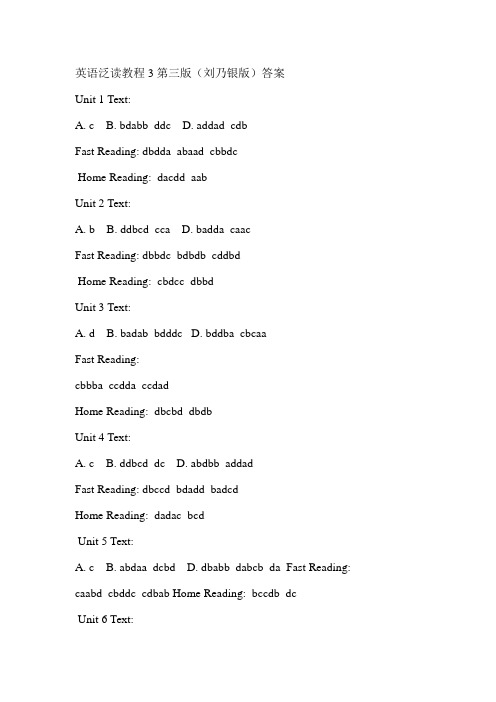
英语泛读教程3第三版(刘乃银版)答案Unit 1 Text:A. cB. bdabb ddc D. addad cdbFast Reading: dbdda abaad cbbdcHome Reading: dacdd aabUnit 2 Text:A. bB. ddbcd cca D. badda caacFast Reading: dbbdc bdbdb cddbdHome Reading: cbdcc dbbdUnit 3 Text:A. dB. badab bdddc D. bddba cbcaaFast Reading:cbbba ccdda ccdadHome Reading: dbcbd dbdbUnit 4 Text:A. cB. ddbcd dc D. abdbb addadFast Reading: dbccd bdadd badcdHome Reading: dadac bcdUnit 5 Text:A. cB. abdaa dcbd D. dbabb dabcb da Fast Reading: caabd cbddc cdbab Home Reading: bccdb dcUnit 6 Text:A. bB. cbcab ddad D. badaa cbaacFast Reading: cabcd aadcb ccdabHome Reading: ccdcd abcUnit 7Text:A. dB. acbda dcaac D. abaac daccd adFast Reading:daada cddbc bdcdb Home Reading: cbadb cddbcUnit 8 Text:A. cB. cddcc dccb D. abdac aaaFast Reading:ccacd bbdad babddHome Reading: dbdbc cbcdUnit 9 Text:A. cB. bccbc dbba D. dcbab dacba c Fast Reading:dcbca bccbc bcddd Home Reading: dcdca bdUnit 10 Text:A. cB. cdccd bacac D. dcdbc acadc bd Fast Reading:dbdcc dccdb bddca Home Reading: cadcb acbbUnit 11 Text:A. dB. adacc dcb D. abacb dcaab adc Fast Reading: dcdab ccbda ccbca Home Reading: bcadb bcdddUnit 12 Text:A. bB. bbbdd ccc D. cdccd acdba dca Fast Reading:bbddc dbdbc cdcdd Home Reading: bcdcc badbb c Unit13 Text:A. cB. cdcad bab D. cbada cabdbFast Reading:cdacc caccd bdbdb Home Reading: bdbcc bdd Unit 14 Text:A. cB. ddcad dab D. dacad babad bFast Reading:ddabb bddca dcccb Home Reading: cdcda ddUnit 15 Text:A. cB. abbac bccdb b D. babcc aaacd bb Fast Reading: caccb accd c ddada Home Reading: cdacd ddc。
泛读三课后练习答案
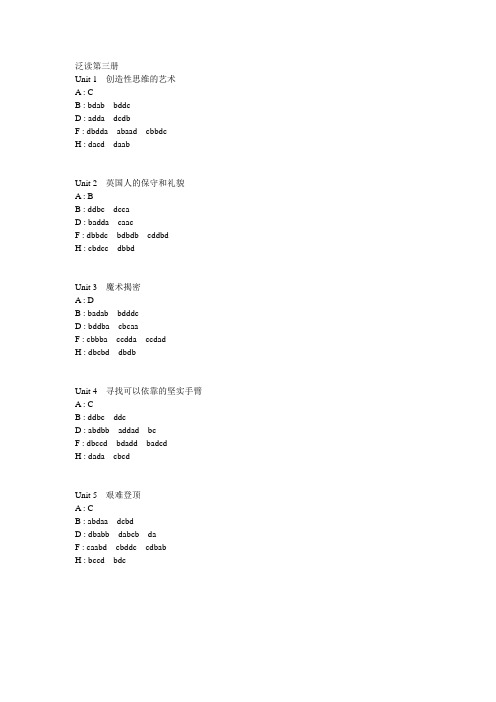
泛读第三册Unit 1 创造性思维的艺术A : CB : bdab bddcD : adda dcdbF : dbdda abaad cbbdcH : dacd daabUnit 2 英国人的保守和礼貌A : BB : ddbc dccaD : badda caacF : dbbdc bdbdb cddbdH : cbdcc dbbdUnit 3 魔术揭密A : DB : badab bdddcD : bddba cbcaaF : cbbba ccdda ccdadH : dbcbd dbdbUnit 4 寻找可以依靠的坚实手臂A : CB : ddbc ddcD : abdbb addad bcF : dbccd bdadd badcdH : dada cbcdUnit 5 艰难登顶A : CB : abdaa dcbdD : dbabb dabcb daF : caabd cbddc cdbabH : bccd bdcUnit 6 药对了,病人错了A : BB : cbcab ddadD : badaa cbaac abF : cabcd aadcb ccdabH : ccdc dabcUnit 7 自己的房间A : DB : acbda dcaacD : abaac daccd adF : daada cddbc bdcdbH : cbadb cddbcUnit 8 假如我有三天光阴A : CB : cddcc dccbD : abda caaaF : ccacd bbdad babddH : dbdbc cbcdUnit 9 梦与睡眠一样重要吗A : CB : bccbc dbbaD : dcbab dacbacF : dcbca bccbc bcdddH : dcdc abdUnit 10 诚信原则A : CB : cdccd bacacD : dcdbc acadc bdF : dbdcc dccdb bddcaH : cadcb acbbUnit 11 非语言交际A : DB : adac cdcbD : abacb dcaab adcF : dcdab ccbda ccbcaH : bcadb bcdddUnit 12 你为何如此聪明A : BB : bbbd dcccD : cdccd acdba dcaF : bbddc dbdbc cdcddH : bcdcc badbbcUnit 13 道德,猿和我们A : AB : cdca dbabD : cbada cabdbF : cdacc caccd bdbdbH : bdbc cbddUnit 14 你怎么知道艺术品的优劣A : CB : ddca ddabD : dacad babadbF : ddabb bddca dcccbH : cdcd addUnit 15 热爱生命A : CB : abbac bccdbbD :babcc aaacd bbF : caccb accdc ddadaH : cdac dddc。
英语泛读教程3第三版答案(免费版)
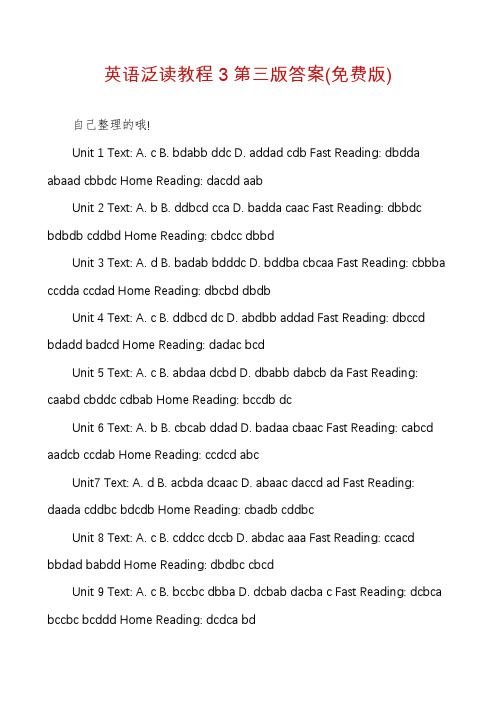
英语泛读教程3第三版答案(免费版)自己整理的哦!Unit 1 Text: A. c B. bdabb ddc D. addad cdb Fast Reading: dbdda abaad cbbdc Home Reading: dacdd aabUnit 2 Text: A. b B. ddbcd cca D. badda caac Fast Reading: dbbdc bdbdb cddbd Home Reading: cbdcc dbbdUnit 3 Text: A. d B. badab bdddc D. bddba cbcaa Fast Reading: cbbba ccdda ccdad Home Reading: dbcbd dbdbUnit 4 Text: A. c B. ddbcd dc D. abdbb addad Fast Reading: dbccd bdadd badcd Home Reading: dadac bcdUnit 5 Text: A. c B. abdaa dcbd D. dbabb dabcb da Fast Reading: caabd cbddc cdbab Home Reading: bccdb dcUnit 6 Text: A. b B. cbcab ddad D. badaa cbaac Fast Reading: cabcd aadcb ccdab Home Reading: ccdcd abcUnit7 Text: A. d B. acbda dcaac D. abaac daccd ad Fast Reading: daada cddbc bdcdb Home Reading: cbadb cddbcUnit 8 Text: A. c B. cddcc dccb D. abdac aaa Fast Reading: ccacd bbdad babdd Home Reading: dbdbc cbcdUnit 9 Text: A. c B. bccbc dbba D. dcbab dacba c Fast Reading: dcbca bccbc bcddd Home Reading: dcdca bdUnit 10 Text: A. c B. cdccd bacac D. dcdbc acadc bd Fast Reading: dbdcc dccdb bddca Home Reading: cadcb acbbUnit 11 Text: A. d B. adacc dcb D. abacb dcaab adc Fast Reading: dcdab ccbda ccbca Home Reading: bcadb bcdddUnit 12 Text: A. b B. bbbdd ccc D. cdccd acdba dca Fast Reading: bbddc dbdbc cdcdd Home Reading: bcdcc badbb cUnit 13 Text: A. c B. cdcad bab D. cbada cabdb Fast Reading: cdacc caccd bdbdb Home Reading: bdbcc bddUnit 14 Text: A. c B. ddcad dab D. dacad babad b Fast Reading: ddabb bddca dcccb Home Reading: cdcda ddUnit 15 Text: A. c B. abbac bccdb b D. babcc aaacd bb Fast Reading: caccb accdc ddada Home Reading: cdacd ddc。
英语泛读3答案__王守仁
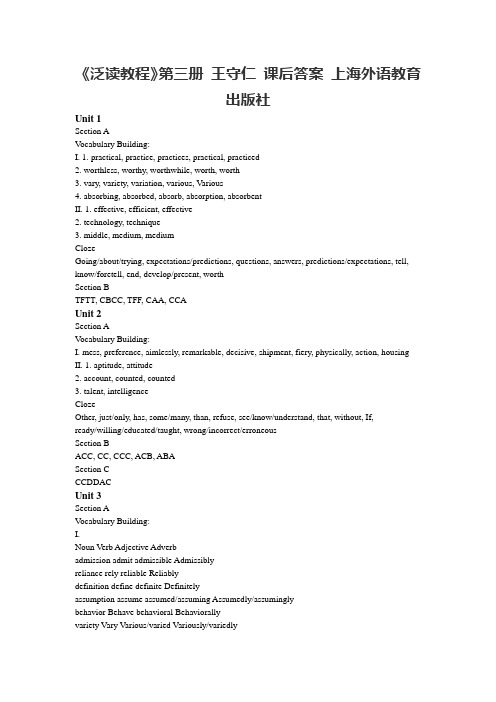
《泛读教程》第三册王守仁课后答案上海外语教育出版社Unit 1Section AV ocabulary Building:I. 1. practical, practice, practices, practical, practiced2. worthless, worthy, worthwhile, worth, worth3. vary, variety, variation, various, Various4. absorbing, absorbed, absorb, absorption, absorbentII. 1. effective, efficient, effective2. technology, technique3. middle, medium, mediumClozeGoing/about/trying, expectations/predictions, questions, answers, predictions/expectations, tell, know/foretell, end, develop/present, worthSection BTFTT, CBCC, TFF, CAA, CCAUnit 2Section AV ocabulary Building:I. mess, preference, aimlessly, remarkable, decisive, shipment, fiery, physically, action, housing II. 1. aptitude, attitude2. account, counted, counted3. talent, intelligenceClozeOther, just/only, has, some/many, than, refuse, see/know/understand, that, without, If,ready/willing/educated/taught, wrong/incorrect/erroneousSection BACC, CC, CCC, ACB, ABASection CCCDDACUnit 3Section AV ocabulary Building:I.Noun Verb Adjective Adverbadmission admit admissible Admissiblyreliance rely reliable Reliablydefinition define definite Definitelyassumption assume assumed/assuming Assumedly/assuminglybehavior Behave behavioral Behaviorallyvariety Vary Various/varied Variously/variedlyPart/partiality Part partial Partiallymanager manage managerial Manageriallycorrelation correlate correlative CorrelativelyAdaptation adapt adaptive adaptivelyII. 1. inspired, aspired, inspired2. token, badges, token3. contemporaries, temporary, contemporaryClozeCommunicate, ways/means/ones, using/saying, in, of, message, meet/have/encounter/experience, causes, meaning, to, eyesSection BBAB, BAC, FFT, TTF, CCBSection CBBDDBCCAFFTFFTUnit 4Section AReading Skill: Skimming2-10 BBAC BCCAAV ocabulary Building:I. moist, betrayal, exclusively, inhumane, amazed / amazing, endangered, marvels, deadlyII. 1. dessert, deserted2. favorite, favorable, favorable3. awarded, reward, awardedClozeParents, idea, at / by, seen, landmarks, instance / example, migrate, guide /direct, pole, effect / influence, It / This, if / whether, experimentsSection BCCB FTF BCA CCB ACCSection CFFTFF FTTFFUnit 5Section AV ocabulary Building:I.Noun Verb Adjective Adverbassumption assume assumed / assuming assumedly /assuminglyacknowledgement acknowledge acknowledged acknowledgedlyreflection reflect reflective reflectivelydomination dominate dominant dominantlycategory categorize categorical categoricallyimplication imply implicative implicativelyreassurance reassure reassuring reassuringlydefinition define definite definitelyII. 1. Historical, historic2. rejected, resist3. test / analyze, analyzedClozeExisted / appeared, ever, head /brain, body, found, language, use / value / significance/ importance, single, passed, ahead, survival / existence, handling / overcomingSection BCAB CBB TTT FTT CACSection CBBAA ACBCUnit 6Section AWord Pretest:CACBA BACAB ABV ocabulary Building:I.availability avail available Availablyconquest conquer Conquering /conqueredConqueringlyluxury luxuriate luxurious Luxuriouslyorigin originate original Originallyoccurrence occur Occurrentsystem systematize Systematical /systematicSystematicallyphonology phonological Phonologicallydecision decide Decided/decisive Decidedly / decisivelyvariety vary various Variouslysuperiority superior SuperiorlyII. 1. peculiar, particular, particular2. assess, access, access3. resources, source, sourcesClozeSex, Men, differs, compliment / words, complimenting, causes, makes, languages, have, outside, understood, have, use, circle / world / fieldSection BCBBBA CBCCC CBACC BASection CBBCAB BACCBUnit 7Section AWord PretestABABC BACV ocabulary Building:I. deduced, behavior, adhere, replacement, option, delicacy, enormous, pursuitII. 1. inquired, required, inquire, required2. compatible, comparable, compatible, comparableClozeSatellite, some, space, asked / wondered, life, sort / kind, orbiting / going / circling, have, living, were, believe, own, solar, where, likely, living, throughSection BFTFFT TTTTF FFBBC ACCSection CBCBCC AEDEBAFDCUnit 8Section AV ocabulary Building:1.occupataion, occupy, occupational, occupationallysegregation, segregate, segregateddiscrimination, discriminate, discriminating / discriminatory, discriminatingly / discriminatorily enforcement, enforce, enforceable, enforceablyexclusion, exclude, exclusive, exclusivelyperseverance, persevere, persevering, perseveringlyconviction, convict, convictive, convictivelyamendment, amend, amendablesuperficiality, superficialize, superficial, superficiallyspectator, spectate, spectatorial2.1. a. job b. career c. jobs d. career2. a.. principal b. principles c. principal d. principle3. a. feminien b. female c. feminineClozeAcceptable, domestic, property, wages, husband, divorce, claims, legal, suit, permitted, make, excluded, lacked, belonged, determinedSection BBACCB CACCC AABBA C TTFSection CCCAACBUnit 9Section AV ocabulary Building:1.1. typifies2. dominant3. familial4. competitive5. vibrate6. descended7. departure8. boom9. countless 10. symbolizes2.1. a. recreative b. recreates c. recreation2. a. rhythm b. rhyme c. rhymes d. rhythmClozeSea, within, of, divides, built/constructed/completed, celebrated, inside/in, attract, together, when Section BFTFTT CCBBC BAACC ACSection CBAACA BCCCCUnit 10Section AV ocabulary Building:1.consequence, , consequent / consequential, consequently / consequentiallysophisticatiion, sophisticate, sophisticated, sophisticatedlyreference, refer, referable, referablyconversation, converse, conversational, conversationallyspace, space, spatial/spacious, spatially/spaciouslydetachment, detach, detachable/detached, detachably/detachedlyintervention, intervene, interveningtype, typify, typical, typically2.1. assure, ensure, assured, ensure2. arises, raised, rise, raised, arisen3. clue, cues, clue, cueClozeWell, separating / isolating, is, own, close, need, look, order, respect, follow, prior, sign/cue, help, was/were, elseSection BBBC TTF BCA CAC TFFSection CTFFTF FFFUnit 11Section AV ocabulary Building:1.information, inform, informative, informativelyspecification, specify, specific, specificallyaddition, add, additional /additive, additionally / additivelyspecialty, specialize, special, speciallynarration, narrate, narrative, narrativelyextension, extend, exxtensive, extensivelyorigin, originate, original, originallyexplosion, explode, explosive, explosivelyambiguity, , ambiguous, ambiguouslyestablishment, establish, established1. extension2. mabiguity3. orignal4. specified5. additional6. unambiguously7. explosion8. information9. specialized 10. narrative 11. establishment2.1. transform, transferred, transferred, transformed2. lonely, alone, lonely, aloneClozeLibrary, amounted, own, burned / destroyed, countries’, send, suggestion / proposal, library Section BACBCB ACCAC ABABB ABSection CBCACC CBCCCUnit 12Section AV ocabulary Building:1. reaction, mass, polluting, planetary, suspicious, alarming, emitted, emerged2.1. warned, threatened2. spread, spread, sprayed3. emergency, emergenceClozeSolve, communities, creative, prevention, disposal, resources, recycloing, waste, increase, place, measures, amountSection BFFTT BCAC FTFF ABC CBCSection CBCAAC CBCUnit 13Section AV ocabulary Building:1.symptom, symptomize, symptomatic, symptomaticallylonging, long, longing, longinglyaddition, add, additional additive, additionally / additivelymanifestation, manifest, manifest, manifestlydepression, depress, depressed / depressing, depressedly / depressinglyinvariability, , invariable, invariablyseparation, separate, separate, separatelycondemnation, condemn, condemnable, condemnablyimagination, imagine, imaginary, imaginarilyaffection, affect, affecting, afeectingly2.1. remedies, recipe, remedy, recipe2. alternate, altered, alternate, alter3. acknowledged, knowledge, acknowledgedClozeStep, acknowledge, prevent, essential, physician, due, physical, psychosomatic, disease, confidence, symptoms, thorough, emotional, upsettingSection BCBCAB CBBCB ABCACSection CTFFFT FTFFFUnit 14Section AV ocabulary Building:1. reluctant, evolution, atrributed, catastrophic, assoicate, indifferent, emerged, stir2.1. evolved, revolved, evolved2. dismay, dismal, dismal, dismay3. contribute, attributed, contributed, attributedClozeCharacteristic / trait / nature, changed / had, to, long, get/eat, possessed / developed /had, stretched /lengthened, longer, passed, After, have, theory, effect/influence, notion/idea, changeSection BDAB FTFTF DAD BAC FTFSection CTFTFT FTFUnit 15Section AV ocabulary Building:1.Prevention, prevent, preventive, preventivelyFederation, federate, federal, federallyInadequacy, , inadequate, inadequatelyDeception, deceive, deceptive, deceptivelyProsperity, prosper, prosperous, prosperouslyLife, live, live/living/aliveEffect, effect, effective, effectivelyEvaluation, evaluate, evaluable /evaluativeResident, reside, residential, residentiallyVision, vision, visional /visionary, visionally / visionarity1. evaluabtion,2. federal3. prosperity4. residential5. effect6. are living7. deceptively8. preventive /effective2.1. simile, metaphor2. ultimate, unanimous, ultimate, unanimousClozeTransportation, distance / away, ground, Steam, trains, electric, station /stop, name, train, three, trains, stairs/steps, passengers/peopleSection BDCDCC CCCAB CBSection CCCACC CCC。
泛读教程--第三册--cloze-答案-原文
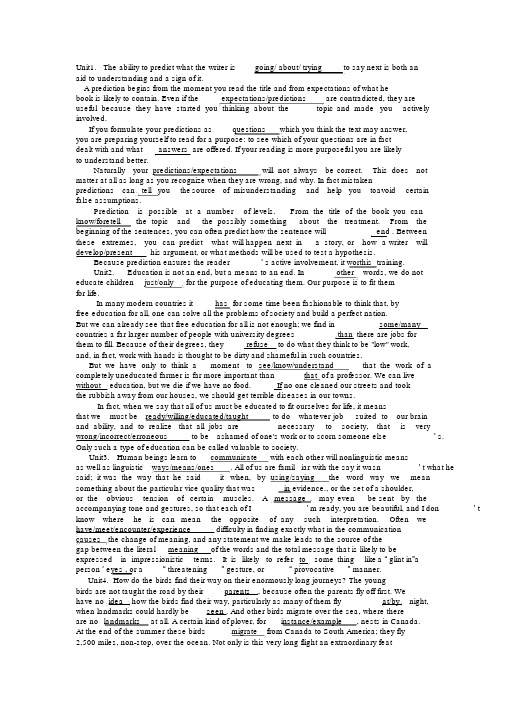
Unit1.The ability to predict what the writer is going/ about/ trying to say next is both anaid to understanding and a sign of it.A prediction begins from the moment you read the title and from expectations of what hebook is likely to contain. Even if the expectations/predictions are contradicted, they areuseful because they have started you thinking about the topic and made you activelyinvolved.If you formulate your predictions as questions which you think the text may answer,you are preparing yourself to read for a purpose: to see which of your questions are in factdealt with and what answers are offered. If your reading is more purposeful you are likelyto understand better.Naturally your predictions/expectations will not always be correct.This does notmatter at all as long as you recognize when they are wrong, and why. In fact mistakenpredictions can tell you the source of misunderstanding and help you to a void certainfalse assumptions.Prediction is possible at a number of levels.From the title of the book you canknow/foretell the topic and the possibly something about the treatment.From thebeginning of the sentences, you can often predict how the sentence will end . Betweenthese extremes,you can predict what will happen next in a story,or how a writer willdevelop/present his argument, or what methods will be used to test a hypothesis.Because prediction ensures the reader’ s active involvement, it worthis training.cation is not an end, but a means to an end. In other words, we do noteducate children just/only for the purpose of educating them. Our purpose is to fit themfor life.In many modern countries it has for some time been fashionable to think that, byfree education for all, one can solve all the problems of society and build a perfect nation.But we can already see that free education for all is not enough; we find in some/manycountries a far larger number of people with university degrees than there are jobs forthem to fill. Because of their degrees, they refuse to do what they think to be "low" work,and, in fact, work with hands is thought to be dirty and shameful in such countries.But we have only to think a moment to see/know/understand that the work of acompletely uneducated farmer is far more important than that of a professor. We can livewithout education, but we die if we have no food.If no one cleaned our streets and tookthe rubbish away from our houses, we should get terrible diseases in our towns.In fact, when we say that all of us must be educated to fit ourselves for life, it meansthat we must be ready/willing/educated/taught to do whatever job suited to our brainand ability, and to realize that all jobs are necessary to society,that is verywrong/incorrect/erroneous to be ashamed of one's work or to scorn someone else’ s.Only such a type of education can be called valuable to society.Unit3.Human beings learn to communicate with each other will nonlinguistic meansas well as linguistic ways/means/ones. All of us are famil iar with the say it wasn’ t what he said; it was the way that he said it when,by using/saying the word way we meansomething about the particular vice quality that was in evidence., or the set of a shoulder,or the obvious tension of certain muscles.A message may even be sent by the accompanying tone and gestures, so that each of I’ m ready, you are beautiful, and I don’ t know where he is can mean the opposite of any such interpretation.Often wehave/meet/encounter/experience difficulty in finding exactly what in the communicationcauses the change of meaning, and any statement we make leads to the source of thegap between the literal meaning of the words and the total message that is likely to beexpressed in impressionistic terms.It is likely to refer to some thing like a “ glint in”aperson ’ eyes , or a“ threatening” gesture, or“ provocative” manner.Unit4. How do the birds find their way on their enormously long journeys? The youngbirds are not taught the road by their parents, because often the parents fly off first. Wehave no idea how the birds find their way, particularly as many of them fly at/by night,when landmarks could hardly be seen . And other birds migrate over the sea, where thereare no landmarks at all. A certain kind of plover, for instance/example, nests in Canada.At the end of the summer these birds migrate from Canada to South America; they fly2,500 miles, non-stop, over the ocean. Not only is this very long flight an extraordinary featof endurance, but there are no landmarks on the ocean to guide/direct the birds.It has been suggested that birds can sense the magnetic lines of force stretching from thenorth to south magnetic pole of the earth, and so direct themselves. But all experimentshitherto made to see whether magnetism has any effect/influence whatsoever onanimals have given negative results. Still,where there is such a biological mystery as migration,even improbable experiments are worth trying.It/this was being done inPoland, before the invasion of that country, on the possible influence of magnetism onpath- finding.Magnets were attached to the birds’heads to see if/whether theirdirection-sense was confused thereby. These unfinished experiments had, of course, tobe stopped.Unit5.Man first existed on earth half a million years ago. Then he was little more thanan animal; but early man had several big advantages over the animals. He had a largehead/brain, he had an upright body , he had clever hands; he had in his brain specialgroups of nerve cells, not found in animals, that enabled him to invent a language anduse it to communicate with his fellow men.The ability to speak was of very greatuse/value/significance/importance because it was allowed men to share ideas, and toplan together,so that tasks impossible for a single person could be successfullyunder-taken by intelligent team-work. Speech also enabled ideas to be passed on fromgeneration to generation so that the stock of human knowledge slowly increased.It was these special advantages that put men far ahead of all other living creatures inthe struggle for survival/existence. They can use their intelligence handing/overcomingtheir difficulties and master them.nguage varies according to sex and occupation.The language of mandiffers subtly from that of women.Men do not usually use expressions such as“ its darling,” andwomen tend not to swear as extensively as men. Likewise, the languageused in addressing men and women differs subtly: we can compliment a man on a newnecktie with the compliment/words“ what a pretty tie, that is!” but not with“ how pretty you look today! ”----an expression reserved for complimenting a woman.The occupation of a person causes his language to vary, particular in the use he makes oftechnical terms, that is, in the use he makes of the jargon of his vacation. Soldiers, dentist,hairdressers,mechanics,yachtsmen,and skiers all have their particular special languages. Sometimes the consequence is that such persons have difficulty in communicating with people outside the vacation on professional maters because thetechnical vocabulary is not understood by all. Although we can relate certain kinds ofjargon to levels of occupation and professional training,we must also note that all occupations have some jargon, even these of the criminal underworld. There may well bea more highly developed use of jargon in occupations that require considerable education,in which words,and the concepts they use , are manipulated rather than objects,forexample in the legal and teaching circle/world/field and in the world of finance.Unit7. The space age began on October 4, 1957, when Sputnik I was launched. Thisfirst man-made satellite was followed by many others,some of which went around thesun. Now the conquest of the space between the planets, and between the earth and thesun, continues at a rapid rate.Each mew satellite and space probe gives scientists new information. As men exploreouter space,some of the questions they have long asked/wondered about will beanswered at last.The greatest question of all concerns life itself. Is there intelligent life out side theearth? Are there people, or creatures of some sort/kind living on Mars, Venus, or someother planet of the solar system? Are there planets orbiting/going/circling around starsother than our sun?The only kind of life we know about would have to be upon a planet.Only a planetwould have the temperatures and gas that all living things seem to need. Until a shorttime ago, we thought there were only a few planets. Today, scientists believe that manystars have planets going around them.We know that there are nine planets in our own solar system-Mercury, Venus, Earth,Mars, Jupiter, Saturn, Uranus, Neptune and Pluto. If any other planets exist in our solarsystem, or anywhere else, our telescopes are not powerful enough to pick up their feeblereflected light. But astronomers guess that one star in a hundred has at least one planetwhere life could exist.We are quite sure that life could begin on a young planet. A new plant would be likelyto contain great seas, together with heavy clouds of water vapor and other gases. Electricstorms would be common. It is possible that simple living cells might from when electricitypassed through the clouds.An experiment made in1952at the University of C hicagoseems to prove this. By passing electricity through nonliving materials, scientist madecells like those of living creatures.Unit8.At the beginning of the nineteenth century the only acceptable roles forwomen were domestic there was virtually nothing for them to do except stay at home orhire out as maids, governesses, and, before long, teachers. Women were not allowed toown property-in most cases, not even the clothes they wore. A working wife was notallowed to keep her wages but was required to turn them over to her husband. In case ofseparation or divorce, a woman had no legal claims on her husband and was not allowedto keep the children. She had to legal status, which meant that she was not permitted tobring suit or to give testimony in courts. Often, she was not permitted to inherit propertyor to make a will. She was barred from public office and excluded form public lifegenerally.For the most part,women lacked opportunities for education,vocationaltraining, and professional employment. The national consensus was that women belongin the home, and determined efforts were made to see that they stayed there.Unit9.Sydney’ s best feature is her harbor.Most Sydneysid ers can see at least aglimpse of blue sea from their windows.Nearly everyone lives within an hour from abeach.On weekends sails of all shapes,sizes and colors glide across the water.Watching the yacht races is a favorite Saturday activity.The harbor divides Sydney into north and south sections. The harbor bridge connectsthe two. It was built in 1932 and cost 20 million.Another Sydney symbol stands on the harbor shore.Sydney’ s magnificent operahouse celebrated its20th anniversary last year.Danish designer Jorn Utzon won aninternational contest with his design. The structure contains several auditoria and theaters.But not all concerts are held in the building. Sunday afternoon concerts on the building’ souter walk attract many listeners.Sydney’ strendy suburb is Paddington.Houses are tightly packed together. Manywere first built for Victorian artists. Now fashionable shops, restaurants, arts galleries andinteresting people fill the area.The best time to visit is Saturday, when vendors selleverything. So there is one of the world’ s most attractive---citiesSydney, Austrian.Unit 10Architectural design influences how privacy is achieved as well as how social contact ismade in public places. The concept of privacy is not unique to a particular culture but what it means isculturally determined.People in the United States tend to achieve privacy by physically separating themselves from others. Theexpression“ good fences make good neighbors” is a preference for privacy from neighbors’ hom can afford it, each child has his or her own bedroom. When privacy is needed, family members may closetheir bedroom doors.In some cultures when individuals need privacy, it is acceptable for them simply to look into themselves. Thatis, they do not need to remove themselves physically from a group in order to achieve privacy.Young American children learn the rule “ knockbefore you enter which”teaches them to respect others ’privacy. Parents, too, often follow this rule priorto entering their children’ s rooms. When a bedroom door is closed it may be a(n) sign to others saying,““I Ineed’m privacy,angry,“”Do ornot” disturb. I’ busy.” For Americans, the physical division of space and the use of architectural features permit a sense of privacy.The way space is used to help the individual to achieve privacy, to build homes or to design cities if culturally influenced. Dr. Hall summarizes the relationship between individuals and their physical surroundings:Man and his extensions constitute one interrelated system. It is a mistake to act as though man was onething and his house or his cities, or his language wee something else.Unit11.The Library of Congress is the largest library in the world.Its books,pamphlets, documents, manuscripts, official, papers, photographs, and prints amount tosome86million items---a number that swells day by day----housed on535miles ofshelves.Congress authorized a library in 1800, which amounted to three thousand books and afew maps when it was destroyed when the British burned the Capitol in 1814. to replace it,Thomas Jefferson sold the government his own library of almost 6500 volumes---thefinest in the nation at the time. The collection, again housed in the Capitol, had grown to55000 when a fire burned more than half of it. In1866 a portion of the Smithsonian Institution library’s was added to the library of Congress,and in the same year the government entered an international program by which copies of U.S. documents wereexchanged for those of other countries. The copyright law of 1870 ensured the librarywould always be up to date by requiring publishers to send two copies of each book published to the library in order to obtain copyright.By 1870 the collections had outgrown its Capitol quarters. A suggestion to raise the Capitol dome and fill it with bookshelves was rejected, and in 1873 Congress authorized acompetition for the design of a library building. A variety of disputes delayed constructionfor more than a de cade, but the library’ s Thomas Jefferson Building was finally opened in 1897.Unit12.As a nation, we starting to realize that we can solve the’t solid waste dilemmajust by finding new places to put trash. Across the country, many individuals, communities and business have found creative ways to reduce and better manage theirtrash through a coordinated mix of practices that includes source reduction.Simply put source reduction is waste prevention.It includes many actions that reducethe disposal amount and harmfulness of waste created. Source reduction can conserveresources, reduce pollution, and help cut waste disposal and handing costs (it avoids thecosts of recycling, landfilling, and combustion).Source reduction is a basic solution to too much garbage: less waste means less of awaste problem. Because source reduction actually prevents the increase of waste in thefirst place ,it comes before other measures that deal with trash after it is already generated. After source reduction, recycling is the preferred waste management optionbecause it reduces the amount of waste going to landfills and conserves resources.Unit13.The first step in helping the patient is to accept and acknowledge his illness.The cause of symptoms must be found, and measures to relieve them and to prevent recurrence must be taken. Thorough examinations are essential. Although the physicianmay suspect that the illness is due to emotional rather than physical cause,he mustsearch carefully for any evidence of physical disease.It is not unknown for an illness considered psychosomatic to be later diagnosed as cancer or some other disease. The thorough search for physical causes of the symptoms helps to gain the patient ’ s confidence. He knows that his condition and symptoms are being taken seriously. If noorganic basis for his complaints is found, he usually will find this news easier to acceptwhen he knows he has had a thorough examination.Finding no physical cause for thedisorder points the way to understandi ng the patient’ s condition. What is the cause? Is it emotional stress?If so,what kind?What are the problems which are upsetting the patients?Unit14.The work of French scientist Jean Baptiste Lamarck(1744-1829)has contributed to the theory of evolution. Lamarck believed that the environment shaped thenature/trait/characteristic of plant and animal life. he believed that the bodies of plantsand animals changed/had to fit their environment and a useful physical change would bepassed on to the plant’ s or animal’ s offspring.For example, Lamarck thought that giraffes developed long necks because they hadto stretch to get/eat the leaves of tall trees for marck didn ’think that giraffes possessed/developed/had long necks all at once, however. He thought that the earliestgroup of giraffes stretched/lengthened their necks a small amount.Their offspring inherited this longer neck. The offspring then stretched their necks a little bit longer.They passed this even longer neck on to their own offspring.After many generations, giraffes developed the long necks that they have today.Not all of Lamarck theory’s is accepted today. Most scientists do not believe that theenvironment has a(n)effect/influence on the evolution of life forms. Nut t hey don ’ t agreewith the notion/idea that a physical change in a plant’ s or animal’ s body is passed on to the offspring. Instead, they believe that a change must occur in the plant’ s or animal’ s cells before a change in offspring can take place.Unit15.In a very big city, in which millions of people live and work,fast,frequentmeans of transportation are of the greatest importance. In London, where most peoplelive long distance/away from their work, all officers, factories and schools would have tochoose if the buses, the trains and the Underground stopped work.Originally the London Underground had steam trains which were not very differentfrom other English trains, except that they went along in big holes under the ground inorder to keep away from the crowded city above their heads.Steam trains used coal,which filled the underground stations with terrible smoke. As a result, the old trains weretaken away, and electric ones put in their place. Now the London Underground is veryclean, and the electric trains make faster runs possible.At every Underground station/stop there are maps of all the Underground lines in London, so that it is easy to see how to get wherever one wants to go. Each station has itsname written up clearly and in large letters several times, so that one can see when onecomes to where one must get out.At some stations one can change to a different underground train,and in some places, such as Piccadilly, there are actually three linescrossing each other. The trains on the three lines are not on the same level, so that thereshould not be accidents. T o change trains, one has to go up or down some stairs to a newlevel. It would be tiring to have to walk up these stairs/steps, so the stairs are made tomove themselves,and all that the people/passengers have to do is to stand and becarried up or down to where they wish.In fact,everything is done to make the Underground fast and efficient.Unit16.Why “ grandfather” clock? Well, these clocks were passed through the familyand so were always thought of as“ grandfather’ s clock.” But the first domestic timepieceswere hung from a nail on the wall.Unfortunately dust got into the works and even worsechildren used to swing from the weights and the pendulum. So first the face and worksand then the weights and the pendulum were protected by wooden cases. Before longthe clock was nearly all case and was stood on the ground/floor and called,not surprisingly, a long-case clock. These“ grandfather” clocks were very expensive,adem asthey were from fine wood ,often beautifully carved or decorated with ivory.Famousmakers of this period included Thomas Tompion, John Harrison and Edward East, butdon’ t get too excited if you find that the clock Grandma left you has one of these nameson the back. Before you start jumping up and downing and shouting,“ we’ re rich, we’ re rich,”remember that plenty of people before the20 th century had the idea of makingcheap clocks/timepieces of famous original and“ borrowing” the names of theirttersbe.And don’ tforget that the first chiming mechanism wasn’ t invented/created/made until1695, so a chiming clock, however charming it sounds, will date from the 18th century. Afake/false/imitated late 17 th century grandfather clock made by East sold recently for justunder 20000.Unit17. Suppose you send your child off to the movies for three hours next Sunday. Andthree hours on Monday and the same number of hours Tuesday, Wednesday, Thursday,Friday, and Saturday. Thus is essentially what is happening to the average child in American today, except it is not the screen in the movie house down the street he sits infront of, it is instead the television set right in your own house.According to the Nielsen Index figures for TV viewing, it is dais that by the time a childgraduates from high school he has had 11000 hours of schooling, as opposed to 15000hours of viewing . I would like to repeat that. By the time the child is 18 years old, he hasspent more hours in front of TV than he has in school.Over TV he will have witnessed bythat time some 18000 murders and countless highly detailed cases of robbery,arson, bombing,shooting,beatings,forgery,smuggling,and torture---averaging approximatelycone per minute in the standard television cartoon for children under the age of ten. Ingeneral, seventy-five percent of all network dramatic programs contain violence.Dr.Albert Bandura of Standford University reaches/draws two conclusions aboutviolence on TV: (1) that it tends to reduce the child tions’againstinhibi acting in a violent,aggressive manner, and (2) that children will imitate what they see. Dr. Bandura pointsout that a child won’ t necessarily run out and attack the first person he sees afterwatching violence on the screen, but that, if provoked later on, he may very well put whathe has learned into practice .One of the lessons of television is that, violence works. If you have a problem with someone, the school of TV says to slap him in the face , stab him in the back. Because most of the program has shown how well violence has paid off, punishment at the end tends not to have much of an inhibitory effect.。
新世纪泛读教程3Unit 2

2This pattern is gradually reduced as the child matures. In teenage girls it may still be detected in the giggling cover-up of the face, with hands or papers, when embarrassed. But by the time we are adult, the childhood hiding, which decreased to adolescent shyness, is expected to disappear altogether, as we bravely stride out to meet our guests, hosts, companions, relatives, colleagues, customers, clients, or friends. Each social occasion involves us, once again, in encounters similar to the ones which made us hide as scared infants and, as then each encounter is slightly threatening. In other words, the fears are still there, but their expression is blocked. Our adult roles demand control and suppression of any primitive urge to withdraw and hide ourselves away. The more formal the occasion and the more dominant or unfamiliar our social companions, the more worrying the moment of encounter becomes. Watching people under these conditions, it is possible to observe the many small ways in which they continue to "hide" behind their mother's skirts. The actions are still there, but they are transformed into less obvious movements and postures. It is these that are the Barrier Signals of adult life.
Unit2英语泛读教程3第三册
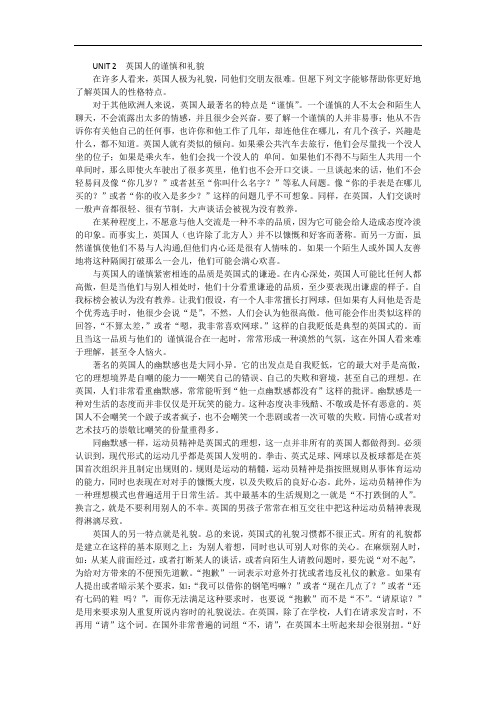
UNIT 2 英国人的谨慎和礼貌在许多人看来,英国人极为礼貌,同他们交朋友很难。
但愿下列文字能够帮助你更好地了解英国人的性格特点。
对于其他欧洲人来说,英国人最著名的特点是“谨慎”。
一个谨慎的人不太会和陌生人聊天,不会流露出太多的情感,并且很少会兴奋。
要了解一个谨慎的人并非易事;他从不告诉你有关他自己的任何事,也许你和他工作了几年,却连他住在哪儿,有几个孩子,兴趣是什么,都不知道。
英国人就有类似的倾向。
如果乘公共汽车去旅行,他们会尽量找一个没人坐的位子;如果是乘火车,他们会找一个没人的单间。
如果他们不得不与陌生人共用一个单间时,那么即使火车驶出了很多英里,他们也不会开口交谈。
一旦谈起来的话,他们不会轻易问及像“你几岁?”或者甚至“你叫什么名字?”等私人问题。
像“你的手表是在哪儿买的?”或者“你的收入是多少?”这样的问题几乎不可想象。
同样,在英国,人们交谈时一般声音都很轻、很有节制,大声谈话会被视为没有教养。
在某种程度上,不愿意与他人交流是一种不幸的品质,因为它可能会给人造成态度冷淡的印象。
而事实上,英国人(也许除了北方人)并不以慷慨和好客而著称。
而另一方面,虽然谨慎使他们不易与人沟通,但他们内心还是很有人情味的。
如果一个陌生人或外国人友善地将这种隔阂打破那么一会儿,他们可能会满心欢喜。
与英国人的谨慎紧密相连的品质是英国式的谦逊。
在内心深处,英国人可能比任何人都高傲,但是当他们与别人相处时,他们十分看重谦逊的品质,至少要表现出谦虚的样子。
自我标榜会被认为没有教养。
让我们假设,有一个人非常擅长打网球,但如果有人问他是否是个优秀选手时,他很少会说“是”,不然,人们会认为他很高傲。
他可能会作出类似这样的回答,“不算太差,”或者“嗯,我非常喜欢网球。
”这样的自我贬低是典型的英国式的。
而且当这一品质与他们的谨慎混合在一起时,常常形成一种漠然的气氛,这在外国人看来难于理解,甚至令人恼火。
著名的英国人的幽默感也是大同小异。
大学英语泛读3答案【精选】.docx
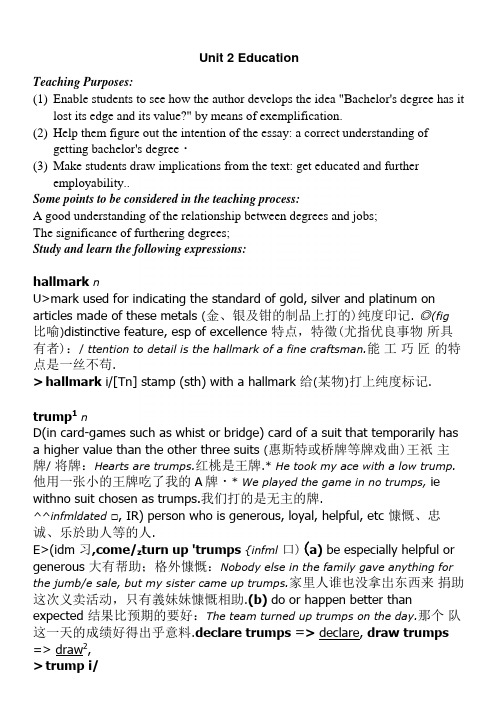
Unit 2 EducationTeaching Purposes:(1)Enable students to see how the author develops the idea "Bachelor's degree has itlost its edge and its value?" by means of exemplification.(2)Help them figure out the intention of the essay: a correct understanding ofgetting bachelor's degree・(3)Make students draw implications from the text: get educated and furtheremployability..Some points to be considered in the teaching process:A good understanding of the relationship between degrees and jobs;The significance of furthering degrees;Study and learn the following expressions:hallmark nU>mark used for indicating the standard of gold, silver and platinum on articles made of these metals (金、银及钳的制品上打的)纯度印记. ◎(fig比喻)distinctive feature, esp of excellence 特点,特徵(尤指优良事物所具有者):/ ttention to detail is the hallmark of a fine craftsman.能工巧匠的特点是一丝不苟.>hallmark i/[Tn] stamp (sth) with a hallmark 给(某物)打上纯度标记. trump1nD(in card-games such as whist or bridge) card of a suit that temporarily has a higher value than the other three suits (惠斯特或桥牌等牌戏曲)王祇主牌/ 将牌:Hearts are trumps.红桃是王牌.* He took my ace with a low trump.他用一张小的王牌吃了我的A牌・* We played the game in no trumps, ie withno suit chosen as trumps.我们打的是无主的牌.^^infmldated□, IR) person who is generous, loyal, helpful, etc 慷慨、忠诚、乐於助人等的人.E>(idm 习,come/z turn up 'trumps {infml口)(a) be especially helpful or generous 大有帮助;格外慷慨:Nobody else in the family gave anything for the jumb/e sale, but my sister came up trumps.家里人谁也没拿岀东西来捐助这次义卖活动,只有義妹妹慷慨相助.(b) do or happen better than expected 结果比预期的要好:The team turned up trumps on the day.那个队这一天的成绩好得出乎意料.declare trumps => declare, draw trumps => draw2,>trump i/1「Tru Tn.D「]〜sth (with sth) take (a card or trick) with a trumD 出I〕牌吃掉(…牌或…墩牌):trumped my ace (with a six)用(六点的)王牌吃掉了我的A牌.2 (phr v) trump sth up (usu passive 通常用於被动语态)invent (a false excuse, accusation, etc) in order to harm sb 编造(谎言、罪名等)加害某人:arrested on a trumped-up charge根据罗织的罪名被捕.# trump-card n (a) card of the suit that is trumps 王牌;将牌;主牌.(b) {fig比卩俞)way of gaining what one wants, esp after trying other ways; most valuable resource为达到目的采取的方法(尤指已试过其他方法);最有效的_招:Finally she played her trump-card and threatened to resign.最後她使出了绝招,扬言要辞职.Etrump/ tr/jnp ; tr/\mp/ n {arch古)sound made by a trumpet 喇叭声;号声. steppingstone n.(名词)1.A stone that provides a place to step, as in crossing a stream. 阶沿石:提供脚踩的地方的石头,如横跨小河时踩的石头2.An advantageous position for advancement toward a goal. 进身的阶:向某一目标努力的有利地位attendance nH>[U, C] action or time of being present 出席;到场;参加J:Attendance at evening prayers is not compulsory.参加晚祷并非駛性规定・ * You have missed several attendances this term.这学期你有几次缺席.5>[C] Inumber of people present They're expecting a large attendance at the meeting.他们希望有很多人出席这次会议.* Attendances have increased since we reduced the price of tickets.我们降低了票价,到场的人就多起來了.O(idm 习语)dance attendance on sb => dance2, in attendance (on sb) present in order to look after, protect or serve sb 护理;卫护;服侍:A nurse was in constant attendance.有个护士随时护理・* The President always has six bodyguards in dose少花加M Q巳总统有六名警卫员时时刻刻在左右保卫.attendance allowance (Br/f) money paid by the state to sb who cares for a severely disabled relative, etc (国家恋给因承理严重伤残的亲友的)护理津贴.attendance centre {Brit) place where young offenders must go regularly for supervisi on, as an alter native to being sent to prison 少年教导所. morph ■verb[V, VN] to cha nge smoothly from one image to an other using computer ANIMATION; to make an image change in this way morphing noun [U] saddle n (a) seat, often of leather, for a rider on a horse z don key, etc or ona bicycle or motor cycle鞍;鞍座;(自行车或摩托车的)牵座・=>illusatApp1 见附录1 插图/ page xiii. (b) part of a horse's back on which this is placed 马背装鞍的部位.E>ridge of high land rising to high points at each end 两峰间的凹下部分;鞍状山脊.=> illus at mountain 见mountain 插图.E>joint of meat from the back of an animal, together with part of the backbone and ribs (动物的)带脊骨和肋骨的大块肉:a saddle of lamb, vefiison, bee方etc羊竜肉、鹿脊肉、牛脊肉.B>(idm 习语)in the "saddle (a) on horseback 骑着马:spend hours in the saddle骑马藝小时.(b) {fig比喻)in a position of control处於控制地位:The director hopes to remain in the saddle (ie in his job) for a few more years. 该董事希望再多留任几年.saddle1[Ip, Tn z Tn.p] ~ up; ~ sth (up) put a saddle on (a horse)给(马)装鞍: saddle up and ride off套上鞍骑走 * saddle one's pony (up)给小马套上鞍.2(phr v) saddle sb with sth qive sb an unwelcome resDonsibilitv, task, etc 让某人承担使人厌恶的责任、任务等:Tve been saddled with the job of orqartizinq the conference.组织会议这件倒霉事交给我了・* The boss saddled her with all the most difficult customers.老板把那些最难应付的顾客全推给她了.hefty {infml口)E>(of a person) big and strong (指人)身高体壮的.O[usu attrib 通常作定语](a) (of a thing) large and heavy (指物)又大又重的:a hefty suitcase又头又沉的衣箱.(b) powerful 有力的:deal sb a heftyblow给予某人重重的一击.(c) {fig比喻)extensive; substantial大量的;可观的:She earns a hefty salary.她的薪水很高.> heftily adv*, a heftily-built fellow高大健壮的人.differential [attrib 作定语]of, showing or depending on a differenee 不同的;有分别的;基於差别的;区别性的:differential treatment of applicants for jobs, eg varyi ng accord i ng to their education, etc 对求职者区别对待(如根据学历等)* Non-EEC countries pay a higher differential tariff. 欧洲经济共同体以外的国家须付高於成员国的差别关税.differential /7E>(also ‘differential wage) (esD B「i0 differenee in rates of Dav for different types of work or workers (不同工种或工人的)工资级弟:a dispute about the differential between men and women workers有关男女工不同酬的争议.O(also differential gear) gear enabling a vehicle's back wheels to turn at different speeds when going round corners (车辆转弯时使两後轮以不同速度转动的)差速器・=>illus at App 1见附录1之插S, page xii. differential calculus {mathematics数)branch of calculus concerned with calculating rates of change, maximum and minimum values, etc 微分(学)・Cf 参看inteqral calculus (integral).turmoil n [C usu sing, U作可数名词时通常作单数,亦作不可数名词] (instance of) great disturbanee, agitation or confusion 骚动;j昆舌L;动舌L: The country was in (a) turmoil during the strike.这个国家在罢工期间陷於_ 片混乱.Of late idm 习语)at the latest no later than 至迟;最晚:Passengers should check in one hour before their flight time at the latest.乘客至迟应在班机起飞前一小时办理登机手续.an early/late night => night, it's z never too Jate to 'mend {saying谚)it is always possible to improve one's character; habits, etc 改过不嫌晚.of late lately; recently 最近以來; 近来. Why do an accelerated MS program?A Master's degree gives more exposure to advaneed technical material. This means that all else being equal, a person with an MS has a competitive advantage compared to someone who has just a BS: it becomes easier to get a job, and pro vides bette「job sec urity.And having a graduate degree usually translates to a higher salary. AnAccelerated MS prog ram is quicke r and cheaper tha n the traditional 4-year baccalaureate (学士学位)and 2-year Master's! Accelerated masters degree programs typically result in greatly reduced time in school, but they aren't necessarily cheaper and often demand great focus and discipline on the part of the student. A variety of schools and institutions offer these programs in the U.S., online and abroad. Many accelerated programs cater specifically to populations with existing family and career responsibilities. They also frequently allow application of real world experience toward degree requirements ・adrift adj [pred 作表语]H>(a)(esp of a boat) driven by wind and water and out of control; drifting (尤指船)随风及水流漂浮而失去控制;漂浮:cut a boat adrift from its moorings割断系索使小船漂离系泊处 * The survivors were adrift on a raft for six days.幸存者在筏子上漂浮了六天.(b){fig比喻)having no purpose; aimless 没有目的;无目标:young people adrift in our big cities在我们大城市里四处游荡的年轻人 * turn sb adrift, ie send sb away withouthelp or support逐出某人(使其漂泊流浪).0(/77/777/ n)(a)u nfastened; loose 脱开;松开:Part of the car's bumper had come adrift.汽车的保险杠有一处松动了. (b)out of order; wrong有故障;出错;有毛病:Our plans went badly adrift.我们的计划严重受挫.fare nDmoney charged for a journey by bus, ship, taxi, etc (公共汽车、轮船、计程车等的)票价:What is the bus fare to London?到伦敦的公共汽车费是多少? * travel at half/full/reduced fare半价他价/减价殊旅行 * economy fares经济舱票价.Opassenger who pays a fare, esp in a taxi (付费的)乘客;(尤指)计程车的乘客.fare-stage n part of a bus route regarded as a unit in calculating the fare (公共汽车路线中的作为计算票价单位的)一段路程.fare ?n [U] food, esp when offered at a meal (used esp with the adjs shown)食物;(尤指)饭菜(尤与F列形容词连用):fine, simple, wholesome fare很好的、简单的、有益健康的食物.fare HI1 (fml文)progress; qeton 进展;过日子:How did you fare Q Q Whatwere vour experiences) while you were abroad?你在国外时好吗(感受如何)?crux n [sing] most vital or difficult part of a matter, an issue, etc 事1W、问题等最重要或最棘手的部分:Now we come to the crux of the problem.现在我们来谈问题的症结所在.GPA■〃O"〃(AmE) the abbreviation for GRADE POINT AVERAGE: He graduated with a GPA of 38Grade (education)For meanings of GPA other than Grade point average, see GPA(disambiguation).A grade in education can mean either a teacher's evaluation of a student's work or a student's level of educational progress, usually one grade per year (often denoted by an ordinal numbe匚such as the '3rd Grade*' or the "12th Grade11). This article is about evaluation of students' work and various systems used in different countries・。
- 1、下载文档前请自行甄别文档内容的完整性,平台不提供额外的编辑、内容补充、找答案等附加服务。
- 2、"仅部分预览"的文档,不可在线预览部分如存在完整性等问题,可反馈申请退款(可完整预览的文档不适用该条件!)。
- 3、如文档侵犯您的权益,请联系客服反馈,我们会尽快为您处理(人工客服工作时间:9:00-18:30)。
How to locate key words
Using Sentence Structure
Using Grammatical Structure
Using Typographic al Aids
Rereading
Rereading established the mechanical process of more rapid eye movement and gives you preliminary practice or a “trial run” with reading at a higher reading rate. 1. Select an article read at your normal speed. Time yourself. 2.Take a break, then reread the material. Push yourself to read faster. Time yourself.
Skimming is the reading style used by flexible readers when their purpose is to quickly obtain a general idea about the reading material. The Skimming style is most useful when you have to read a large amount of material in a short amount of time. When using the Skimming style, you should identify the main ideas in each paragraph and ignore the details in supportive sentences. Because you are only looking for the main idea in each paragraph you read, a lower level of comprehension is to be expected than when using the Study Reading style
Example
Key word reading is a new technique. Although it is faster than most of the careful reading techniques, the reader must expect a decrease in factual comprehension. In some situations, it is worth the loss, depending on the reader’s purpose and the type of material being read.
Key Word Reading
.Key word reading involves skipping over nonessential words and reading only those words and phrases which carry the primary or core meaning of each sentence. Key word reading id similar to reading a telegram, the headline in a newspaper, or a news caption which is running across the bottom of a television screen while a program is in progress. TV News Caption: Airline Hijacking Los Angeles 53 hostages. Four Hijacker. Identity and Purpose Unknown
It involves widening your eye span so that you can see several words in one fixation.
Phrase reading is a technique that builds fluency, aids comprehension, and improves oral reading.
Reader Factors
How many words do you determine to learn per day? Core parts, topic, main idea and details Schema. To Know
To Practice
To Learn
Vocab Level
Comprehension Ability Background Knowledge
Techniques for Speed Reading
Phrase Reading
What is Phrase Reading Seeing more than one word in a single eye fixation.
Techniques for Speed Reading
How to Phrase Read
Group words that naturally go together To Read efficiently you should try to get rid of bad reading habits and get into good ones Group words together into meaningful units Studying economics is difficult because it requires careful attention to facts and figures Practice phrase reading persistently You may find it takes several weeks of continued practice to develop the habit.
Education costs money, but then so does ignorance.
Education
Skimming
LOGO
Education's purpose is to replace an empty mind with an open one. Education is what remains after one has forgotten everything he learned in school. - Albert Einstein (1879-1955)
Text Factors
Vocabulary
Understanding becomes difficult or impossible and your reading rate is slow
Ideas and Concept
Complicated ideas or a sophisticated line of reasoning
Education
Skimming
Contents
Speed Reading Speed Techniques What is Skimming When to SKIM How to SKIM
Reading Speed
800
600 300 150
2007
Phrase Reading Example
Actually, the common cold is not as simple as it seems. It can be caused by any of 200 different viruses, and it can bring misery in eight ways: sore throat, sneezing, runny nose watery eyes, aches and pains, mild fever, nasal congestion, and coughing.
When to Skim?
How to Skim
Rules: Eyes float down over the content for key words. Pay attention to direction words, too. Steps: 1. read the title. 2. read the first paragraph completely. 3. Read subheadings and first sentences of remaining paragraphs. 4. Alternately read the body of the material. 5. If the final paragraph appears to be a summary, read it completely.
Key word reading is a new technique. Although it is faster than most of the careful reading techniques, the reader must expect a decrease in factual comprehension. In some situations, it is worth the loss, depending on the reader’s purpose and the type of material being read.20源自820092010
Speed
Speed Reading Factors That Influence Reading Rate
Sentence Length
